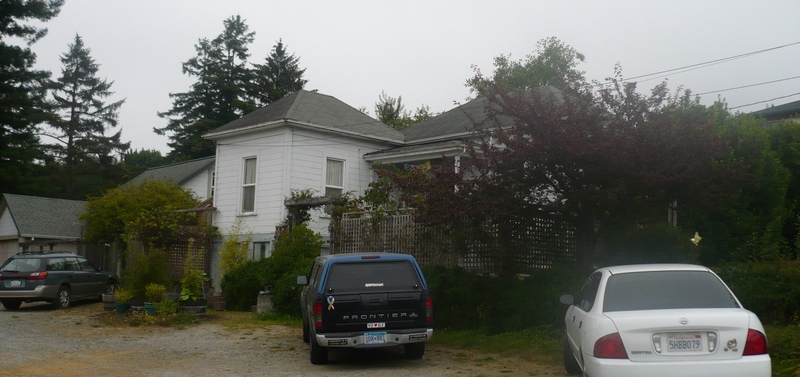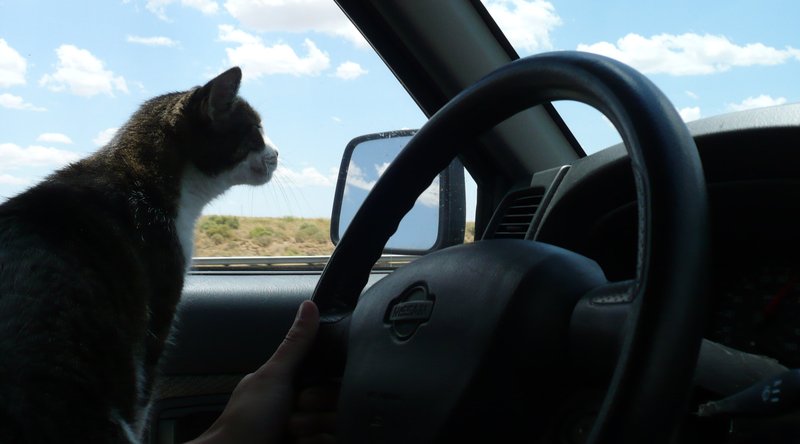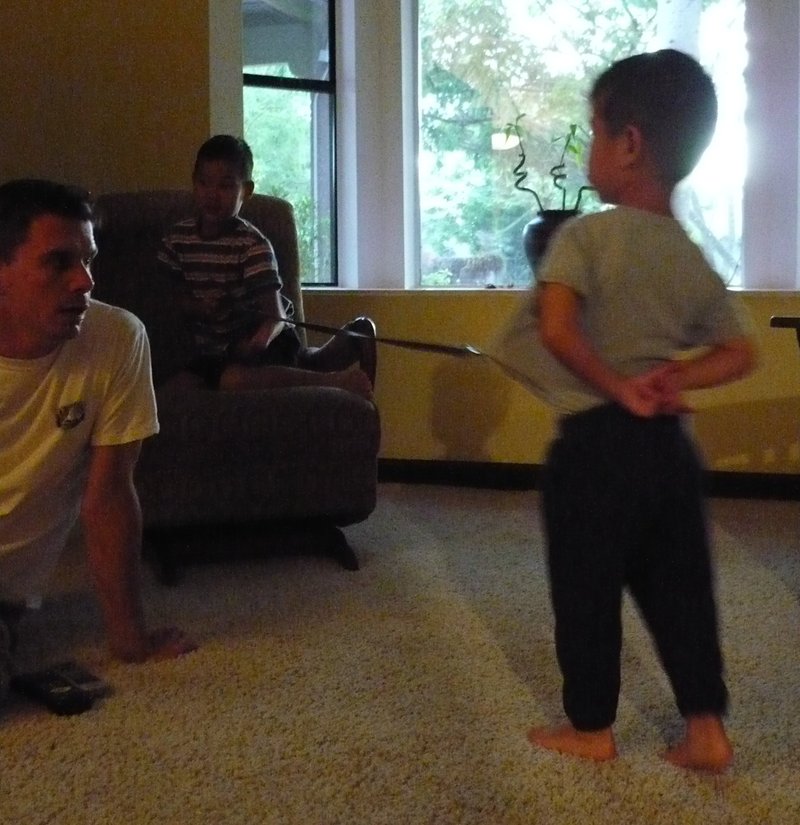I had bought a "package" tour, for the simple reason that it seemed like a much better value, given the limited scope of my intended visit.
Included in the package was: round trip by ferry from Algeciras to Ceuta; bus (or, as it turned out, minivan) passage from Ceuta to Tetouan to Tanger to Ceuta (a little triangle on the map, about 50 km to a side); three meals – lunch, dinner, breakfast; hotel in Tanger.
Morocco, day 1.
I showed up at the offices of Eurotras (eurotrash?), the tour company, at the ferry terminal in Algeciras, at around 8 am. They gave us (those of us on the tour) tickets for Ceuta (not the return tickets, which we were to receive in Ceuta on return), and an envelope that contained the documentation for the remainder of the trip, to present to the guide at Ceuta.
My companions were a young portuguese couple, she spoke spanish fairly well, but her husband was brazilian (from Minas Gerais) and was adamantly monolingual. I can understand portuguese fairly well if I work at it, but Rodrigo was pretty darn opaque. Victoria, however, was interesting to talk to. She works in a temporary agency (one of those people who interview the temps and place them in jobs) in Lisboa. She had a lot of penetrating observations on the neo-liberal economic model and the precariousness of the world's job markets.
When we arrived at Ceuta, we were met by two guides – a gentleman named Mohamed and another whose name I never quite figured out. Mohamed spoke excellent spanish and atrocious english, but insisted on trying to say everything in both languages, which was occasionally quite painful to listen to.
We were also joined at this point by a retired british couple, who were staying with relatives in Gibraltar and had decided to make a day trip to Morocco. The Portuguese couple were also on a day trip… I was the only one who was planning to stay overnight.
We got into a minivan that had phenomenally uncomfortable seats. Perhaps I'm overly used to the reasonably comfortable seats on trains, these days.
At the border with Morocco, there was a substantial delay. Based on reading I'd done online the night before, this is standard – it's got to do with the fact that Ceuta is to Morocco what Gibraltar is to Spain – an "illegitimately occupied enclave." The British man (Doug? A retired lawyer) observed the interesting parallel, and I said it seemed like a classic "pecking order" – britain takes gibraltar from the spanish, so spain takes ceuta from the moroccans, so the moroccans take all of former spanish sahara from the sahareños, who live in refugee camps in the desert and have the highest infant mortality rate in the world. All's fair in love, war, and geopolitics.
So from the Moroccan perspective, we were entering their country from an administrative limbo. Fortunately, our guides mediated this complex process – one commentary online I read said that this was just one of many places where having a guide is not just a good idea, but really the only option.
Really, in this very different world, every transaction must be mediated. So, we drove down the mediterranean coast, for about an hour, as low, cobalt clouds scudded over the rubble-strewn countryside. Reminded me of the landscape in the northern part of Baja California, where, in the winter, the hills are equally green and the towns are equally squalid. It was chilly, and a hard wind blew from the north, making the whitecaps on the mediterranean tilt sideways.
We arrived in Tetouan and got off the van, and plunged into the ancient (14th-16th century) medina. Tetouan was founded in the 14th century, but received it's primary population in the thousands of mozarabs (muslim spaniards) and jews who were expelled from spain by the catholic hierarchy at the end of the 15th c.
There was a steady drizzle, which mixed with the rotting vegetables, spit, concrete "crumbs," and dogshit to make a light coating of sludge in the narrow passageways of the medina. Everywhere behind our little tour-group, children and gap-toothed men would follow, demanding "solo un e-uro please merci" in exchange for some trinket or another. And men selling belts, oranges, gum. And women on their knees in heavy kaftans and berber hats.
The guides showed us the jewish quarter, and the discourse was a weird case of cognitive dissonance. On the one hand, he expressed pride that Morocco treated jews as equal citizens, had "opened its arms" to the jews expelled from spain in the 15th c., and later to those escaping from Nazism. He emphasized the current, relatively peaceful, coexistence of muslims, catholics, and jews in the kingdom.
On the other hand, Mohamed also was keen to observe that, "como los judios tenien todo el dinero" (since the jews have all the money), they've moved from the medina to nicer neighborhoods. I suppose that, in stereotype terms, many Jews are probably well-off – all stereotypes come from somewhere. But the bitterness with which the words were pronounced was profoundly anti-Jewish.
One has to be careful with the word anti-semite – this word is never quite accurate as currently used (ie. to refer to anti-Jewish sentiment), but is especially inaccurate when applied to arabs, who also represent a great semitic language and civilization. One could say that current european anti-semitism is finally coming "home" to its etymological roots, since modern europeans seem to hate equally both arabs and jews. But an arab anti-semite is etymologically nonsensical. More on racism, later.
Then came the first of the "hard" sells. We were taken to a carpet shop. Apparently, foreign visitors to morocco are expected to buy rugs. Despite repeated reassurances that "no tienes que comprar nada" – you don't have to buy anything – the pressure was intense, and the prices – as I persisted with "no gracias" "non merci" "laa shukran" – shrunk tenfold. A carpet quoted at 770 euros dropped to 80 euros an hour later. I suppose there are visitors who buy sooner than later, and pay the first price?
What would that same rug be priced at, at wal-mart? 39.99? What's the person's labor worth – probably a berber woman – who made the rug? At Wal-Mart's price, it's pennies an hour… less. At the tourist special (770 euros), she may actually be close to american minimum wage. But what american or european would be happy paying that price? She wouldn't see that money anyway … she's already been paid, perhaps 20 or 30 dollars, for her work. The rest goes to the middlemen – whether a merchant in the medina in tetouan or to the corporate coffers at wal-mart.
The mint tea they served at the carpet shop was quite tasty. I think that the merchants were especially annoyed with me, as opposed to the brits or the portuguese, because the mistook my willingness to chat for an interest in their product. It was really a linguistic accident – I was the only one sufficiently fluent in a language they were comfortable with to be able to chat (Spanish – many Moroccans are quite fluent in Spanish, especially in the north, which was – until after WWII – a Spanish colony).
I found that, on the street, a refusal to say anything but "laa, shukran" was the best strategy to discourage sellers of things – my theory is that I thus could convert myself into a linguistic enigma – it was clear I knew no Arabic except for those words, but my refusal to lapse into anything else (English, French, Spanish) prevented them from getting their grip on any kind of "discursive handle." Left without a linguistic point of contact, they could only stare at me and gesture to their product.
Crap, do I sound condescending? I don't mean to be. Maybe I should try to comment on that, further on, but, let me try to explain something. Tourism is an act of violence. It's violent in the same sense that pouring a volatile chemical (say, an acid or a base) into a thriving colony of insects living in a terrarium is an act of violence. The chemical consists of molecules that either have a surplus or a shortage of electrons, and these "radicals" naturally destabilize those around them, molecules otherwise perfectly content to get on with their "lives" as parts of bugs or plants.
Ripping away those electrons destabilizes the equilibrium, and next thing you know, all biosystems and ecosystems are damaged or completely broken. Likewise, the tourist arrives with a surplus of money and is alien to the local chemical balance, and a storm ensues as the elements in the system seek a new equilibruim.
I like the metaphor, though I expect it needs to be developed. Meanwhile, let's ponder the accident that in casual american english, at least, terrorism and tourism are near-homonyms – I think my mother pointed this out to me in an email recently. Let's play with that.
My thinking is that the best way to avoid being guilty of this kind of violence is to "go native." You work to remove the flags that tell those around you that you're a "radical" and mark you as a source of surplus. This is possible for me, as an american, in europe, and, to a more limited extent, also in latin america. But there are issues of race and comportment that make such chameleonism impossible outside of the "occidental" world.
This is what I wanted to comment on earlier, vis-a-vis race: racism is just that process whereby distinguishing features beyond the control of the individual possessing them become cultural "flags" indicative of traits feared or devalued by others.
The human brain is a sophisticated but non-standard statistical engine of a sort… it makes observations of saliency and calculations of probability and draws correlations of its own accord, and in ways not necessarily "rational." If a man in a purple hat comes into a room and starts shooting people, and then the next day a man with a purple hat comes into the same room with some of the same people, you can bet those people are going to get nervous. Why? Because they made a correlation on a salient trait. It's not statistically valid by standard statistics, but the process is driven by saliency, not just probability.
One definition of data analysis (my current "profession"?) is the search for true saliency amid the sea of false salients – ie. statistically legitimate correlations. But when people criticize racial profiling on the grounds of "accuracy" or "fairness," they're missing the statistical boat. The only grounds for criticizing racial profiling are moral-ethical – by which I mean you simply have to take, a priori, that such profiling is wrong because it "dehumanizes" (also a problematic term, e?).
So then we had some lunch. A delicious curry-like soup, couscous, with chicken, carrots, leeks or cabbage(?), beef on skewers, some sweet bread for desert. The restaurant itself was beautiful, with tiled arabesques, arches, rugs on the floor.
 The house where I grew up now has gardens all around it, and is very different from when I lived here, but it is strikingly beautiful – Peggy and Latif have done spectacular things with both the internal and external spaces. All surrounded by gardens and greenery, the redwoods off to the northwest still, but both front yard and back now filled with paths and patches of plants.
The house where I grew up now has gardens all around it, and is very different from when I lived here, but it is strikingly beautiful – Peggy and Latif have done spectacular things with both the internal and external spaces. All surrounded by gardens and greenery, the redwoods off to the northwest still, but both front yard and back now filled with paths and patches of plants.

